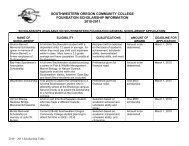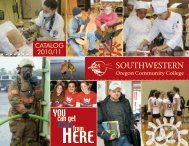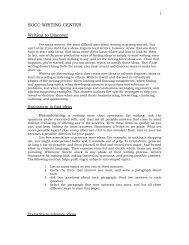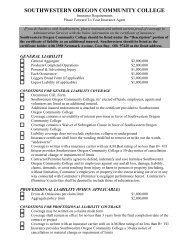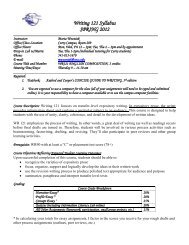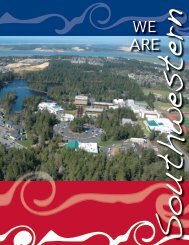Part 1 3.7.qxp - Southwestern Oregon Community College
Part 1 3.7.qxp - Southwestern Oregon Community College
Part 1 3.7.qxp - Southwestern Oregon Community College
You also want an ePaper? Increase the reach of your titles
YUMPU automatically turns print PDFs into web optimized ePapers that Google loves.
Course Descriptions<br />
HE252 Standard First Aid and CPR for the<br />
Professional Rescuer<br />
3 credits (3 lec hrs/wk)<br />
This course follows the American Red Cross, American<br />
Heart Association, and OSHA requirements to prepare<br />
the student with knowledge, skill, and techniques<br />
necessary to recognize and provide care in first aid,<br />
respiratory, and cardiac emergencies, using the latest<br />
CPR and emergency cardiac care guidelines. Students<br />
learn how to perform rescue breathing, one-rescuer and<br />
two-rescuer CPR, how to use airway adjuncts<br />
(bag-valve-mask, oxygen administration), and how<br />
to operate an Automated External Defibrillator (AED).<br />
American Red Cross Professional Rescuer and<br />
First Aid certification is given upon completion of<br />
course requirements.<br />
HEALTH OCCUPATIONS AND<br />
EMERGENCY MEDICAL<br />
TECHNICIAN<br />
HE9404 Emergency Vehicle Driver<br />
1 credit (10 lec, 2 lec-lab hrs/total)<br />
This course covers various topics which address both<br />
past and potential causes of emergency vehicle<br />
problems. The information provided demonstrates where<br />
vehicle shortcomings can be found during operation and<br />
suggests ways to operate the vehicle within safe ranges.<br />
HE9424/HE9419 Hospice Training<br />
3 credits (3 lec hrs/wk)<br />
This course prepares adults to work with hospice clients<br />
(terminally ill persons) and their families as hospice<br />
volunteers. Attendees learn the history of principles of<br />
hospice care, common experiences of hospice clients as<br />
they move through the dying and bereavement<br />
processes, and skills necessary to be effective in the<br />
volunteer role. Although this course focuses on<br />
interpersonal interventions and activities personal and<br />
cultural reactions to death and dying are included.<br />
HE9433/9443 Emergency Medical Technician-<br />
Basic (Refresher)<br />
2.5 credits (20 lec, 16 lec-lab hrs/total)<br />
This course is considered to be a “refresher course” for<br />
those students who have previously completed an<br />
EMT-Basic course, yet were unable to pass the state<br />
written and/or the practical examination. This course<br />
prepares selected individuals for the certification process<br />
in <strong>Oregon</strong> as an Emergency Medical Technician - Basic.<br />
Prerequisites: HE257(A/B) or HE928(A/B) with a “C”<br />
or better.<br />
HE257/928 Emergency Medical Technician-<br />
Basic (A/B)<br />
10 credits (4 lec, 3 lab, hrs/week)<br />
This course prepares individuals for certification in<br />
<strong>Oregon</strong> as an Emergency Medical Technician-Basic.<br />
Develops skills in recognition of symptoms of illness<br />
and injuries and proper procedures of emergency care.<br />
HE928 is for volunteers not pursuing the EMT<br />
one- year Certificate.<br />
Prerequisites: Students are required to complete a<br />
special application and meet minimum entrance<br />
requirements to register for the course. Application<br />
information can be obtained through the EMT Program<br />
Coordinator's Office or the Student Services Office.<br />
HE258/931 Emergency Medical Technician<br />
Intermediate (A/B)<br />
8 credits (3.8 lec, 2.2 lab hrs/week)<br />
This course prepares individuals for certification in<br />
<strong>Oregon</strong> as an Emergency Medical Technician-<br />
Intermediate. The course covers theory and practice<br />
of procedural responsibilities delegated to the<br />
EMT-Intermediate. The course incorporates discussion,<br />
demonstration, and practical application of the following:<br />
roles and responsibilities, patient assessment,<br />
oxygenation, ventilation, airway adjuncts, shock,<br />
intravenous and intraosseous therapy, basic ECG<br />
monitoring, defibrillation, pharmacology and<br />
EMT-Intermediate protocols. Upon successful completion<br />
of the EMT-Intermediate curriculum course, a student will<br />
be eligible to sit for the state EMT-Intermediate certifying<br />
examinations, ventilation, airway adjuncts, defibrillation,<br />
shock, intravenous and intraosseous infusions,<br />
defibrillation and basic ECG monitoring, pharmacology<br />
and medications, and protocols.<br />
Prerequisite: HE258A or HE931A with a “C” or better.<br />
HE260/9360 First Responder<br />
3 credits (30 lec, 10 lab hrs/total)<br />
This course prepares students for certification as a First<br />
Responder. The course offers training designed to<br />
improve the quality of emergency care rendered to<br />
victims of accidents and illness. Students are taught to<br />
be proficient in providing basic life support, and to<br />
take actions necessary to minimize patients’ discomfort,<br />
and to prevent further complications. Must be at least 16<br />
years of age.<br />
<strong>Southwestern</strong> <strong>Oregon</strong> <strong>Community</strong> <strong>College</strong> 2006-07 Catalog www.socc.edu Course Descriptions 175



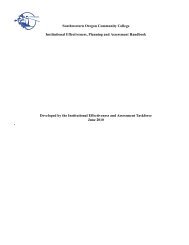
![SWOCC Viewbook [PDF] - Southwestern Oregon Community College](https://img.yumpu.com/26373688/1/190x245/swocc-viewbook-pdf-southwestern-oregon-community-college.jpg?quality=85)

